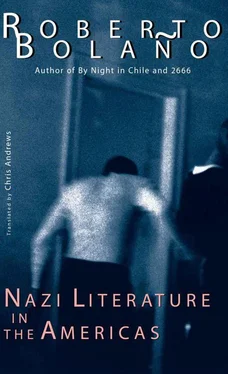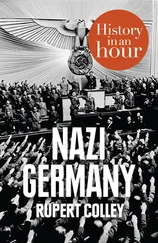In 1964, after sojourns in various clinics, Luz surprised her scarce but faithful readers once again with a new a collection entitled Like a Hurricane : ten poems, one hundred and twenty pages, with a preface by Susy D’Amato (who could hardly understand a line of Luz’s poetry but was one of her few remaining friends), brought out by feminist publishers in Mexico, who would soon come to regret having gambled on a “well-known far-Right activist,” although, at the time, they had been unaware of Luz’s real allegiances, and the poems themselves were free of political allusions, except for the odd unfortunate metaphor (such as “in my heart I am the last Nazi”), always in the context of personal relationships. The book was republished a year later in Argentina, where it garnered a number of favorable reviews.
In 1967, Luz returned to Buenos Aires, where she was to remain for the rest of her life. An aura of mystery enveloped her. In Paris, Jules Albert Ramis had translated practically all of her poetry. She was accompanied by a young Spanish poet, Pedro Barbero, who acted as her secretary and whom she called Pedrito. This Pedrito, as opposed to her Argentinean husbands and lovers, was helpful, attentive (although perhaps a little uncouth) and above all loyal. Luz took control of American Letters once again and set up a new publishing house, The Wounded Eagle. She was soon surrounded by a host of followers who laughed at all her jokes. She weighed two hundred and twenty pounds. Her hair came down to her waist. She rarely washed. Her clothes were old and often ragged.
Luz Mendiluce’s emotional life now entered a calmer phase. In other words, she ceased to suffer. She took lovers, drank to excess and was prone to occasional cocaine abuse, but always maintained her spiritual balance. She was severe. Her reviews were feared, and eagerly anticipated by those who were not the targets of her venomous, barbed wit. She entered into bitter, public feuds with certain Argentinean poets (all male and famous), cruelly satirizing their homosexuality (a practice of which she disapproved in public, although many of her friends were gay), their humble social backgrounds, or their Communist convictions. Many women writers in Argentina admired her and read her work, although not all of them would admit to it.
The struggle with her brother Juan over the control of American Letters (the magazine in which she had invested so much, and the source of so many disappointments) took on epic proportions. She was defeated, but the young remained loyal. She divided her time between a large apartment in Buenos Aires and a ranch in Paraná, which became an artistic commune over which she could reign unopposed. There, by the river, artists conversed, took siestas, drank and painted, unaffected by the political violence beginning to ravage the rest of the country.
But no one could remain safe from harm. One afternoon, Claudia Saldaña visited the ranch with a friend. She was young, she wrote poetry and she was beautiful. For Luz it was love at first sight. Quickly arranging an introduction, the hostess lavished attention upon her visitor. Claudia Saldaña spent an afternoon and a night at the ranch, returning to Rosario, where she lived, the next morning. Luz recited poems, displayed the French translations of her books and the photo of herself as a baby with Hitler, encouraged the young woman to write, asked to read her poems (Claudia Saldaña said they were no good, she was just a beginner), insisted that her guest keep a little wooden figure she happened to pick up, and finally tried to get her drunk, hoping to make her too ill to leave, but Claudia Saldaña left anyway.
After two days spent in an utter daze, Luz realized that she was in love. She felt like a girl. She got hold of Claudia’s telephone number in Rosario and called her. She was almost sober; she could barely control her emotions. She asked if they could meet. Claudia agreed: they could meet in Rosario in three days’ time. Luz was beside herself; she wanted to see Claudia that night or the next day at the latest. Claudia stood firm: she had binding, prior engagements. What cannot be cannot be, besides which, it’s impossible. Luz accepted her conditions with a joyful resignation. That night she cried and danced and drank until she passed out. No doubt it was the first time that anyone had made her feel that way. True love, she confessed to Pedrito, who agreed with everything she said.
The meeting in Rosario was not as marvelous as Luz had hoped. Claudia clearly and frankly set out the reasons why a closer relationship between them was impossible: she was not a lesbian; there was a significant age difference (Luz being more than twenty-five years older); and, finally, their political convictions were deeply dissimilar if not diametrically opposed. “We are mortal enemies,” said Claudia sadly. This affirmation seemed to interest Luz. (Sexual preference was a triviality, she felt, in a case of real love. And age was an illusion. But she was intrigued by the idea of being mortal enemies.) Why? Because I’m a Trotskyite and you’re a Fascist shit, said Claudia. Luz ignored the insult and laughed. And there’s no way around that? she asked, desperately lovesick. No, there’s not, said Claudia. What about poetry? asked Luz. Poetry is pretty irrelevant these days, with what’s going on in Argentina. Maybe you’re right, Luz admitted, on the verge of tears, but maybe you’re wrong. It was a sad farewell. Luz had a sky-blue Alfa Romeo sports car. Easing her rotund physique into the driver’s seat was no simple task, but she undertook it bravely, with a smile on her face. Claudia looked on from the doorway of the café where they had met, unmoving. Luz pulled away, with the image of Claudia fixed in the rear-view mirror.
In her position anyone else would have given up, but Luz was not anyone. A torrent of creative activity swept her away. In the past, falling in or out of love had dried up the flow of her writing for long periods. Now she wrote like a mad woman, driven perhaps by a presentiment of what destiny had in store. Every night she called Claudia: they talked, argued, read poems to each other (Claudia’s were downright bad but Luz was very careful not to say so). Every night, without fail, she begged: when could they meet again? She made wild plans: they could leave Argentina together, go to Brazil, or Paris. At these suggestions the young poet burst out laughing, but there was nothing cruel in her laughter; if anything, it was tinged with sadness.
Suddenly Luz found the countryside and the artistic commune on the Paraná stifling. She decided to return to Buenos Aires. There she tried to resume her social life, see her friends, go to the movies or the theater. But she couldn’t. Nor did she have the courage to visit Claudia in Rosario without her permission. It was then that she wrote one of the strangest poems in Argentinean literature: My Girl , 750 lines full of love, regrets and irony. She was still calling Claudia every night.
It is not unreasonable to suppose that a sincere, mutual friendship had developed in the course of all those conversations.
In September 1976, bursting with love, Luz leapt into her Alfa Romeo and sped off to Rosario. She wanted to tell Claudia that she was willing to change, that she was, in fact, already changing. She arrived to find Claudia’s parents in a desperate state. A group of strangers had kidnapped the young poet. Luz moved heaven and earth, mobilized her friends, used her connections, then those of her mother, her elder brother and finally Juan’s connections too, all in vain. Claudia’s friends said the army had taken her. Luz refused to believe anything and waited. Two months later Claudia’s body was found in a garbage dump in the north of Rosario. The next day Luz set off for Buenos Aires in her Alfa Romeo. Halfway there she crashed into a gas station. The explosion was considerable.
Читать дальше












